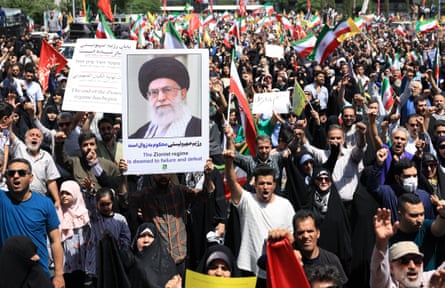Israel’s assault on Iran, including its nuclear and ballistic weapons programme, is unlikely to secure its long-term strategic objectives, even if Benjamin Netanyahu manages to persuade the Trump administration into joining the conflict in the coming days and weeks, experts have said.
According to diplomats, military specialists and security analysts, Israel – and its prime minister – is likely to face mounting headwinds in the campaign, amid warnings that it risks dangerously destabilising the region.
There is mounting scepticism over whether even the US’s use of massive ground-penetrating bombs would be able to knock out Iran’s Fordow nuclear facility, which is buried deep beneath a mountain, and questions have emerged about Israel’s ability to sustain a long-range offensive that has exposed its cities to counterattack by ballistic missiles.
Experts make the distinction between Israel’s operational success in targeting key Iranian sites and individuals, and its strategic objectives which appear to have expanded to regime change in Tehran, on top of destroying its nuclear programme.
“There is a dominant trend in Israel going back to the formation of the state that has suggested to politicians that violence will deliver a solution to what are political problems,” said Toby Dodge, professor of international relations at the London School of Economics.

“My gut feeling is Iranian regime is more stable than has been suggested. And because Iran has a long history of commitment to technological modernisation and proliferation, well, that’s something you can’t simply remove with a bomb.”
Analysts are also puzzled by an Israeli strategy that appears to have gambled on triggering a conflict in the hope of pushing a highly erratic US president in Donald Trump to join, supplying the firepower that Israel lacks in terms of massive bunker-busting bombs.
Experts assess that the US would probably have to use several of these bombs, which would need to be dropped relatively close to the Fordow plant, protected by up to 90 metres of bedrock, in a complex and risky operation that is not guaranteed to succeed, and would probably draw retaliation from Iran against US bases, risking further escalation.
“Subcontracting the Fordow job would put the United States in Iran’s sights,” Daniel C Kurtzer, a former US ambassador to Israel, and Steven N Simon, a veteran of the national security council, wrote in Foreign Affairs this week.
“Iran would almost certainly retaliate by killing American civilians. That, in turn, would compel the United States to reciprocate.
“Soon enough the only targets left for Washington to hit would be the Iranian regime’s leaders, and the United States would again go into the regime-change business – a business in which exceedingly few Americans want to be involved any longer.”
The prospect of regime change, perhaps by killing Iran’s supreme leader, Ayatollah Ali Khamenei, which has been raised by Israeli officials (and reportedly vetoed by Trump) is already causing profound alarm in the region.
Grand Ayatollah Ali al-Sistani, the senior Iraqi cleric, made a rare intervention, warning of the profound dangers to the region.
Another sceptic is Andreas Krieg, an associate professor in the Department of Defence Studies at King’s College London, who has worked widely in the Middle East and is doubtful that air power can alone can make the kind of impact being sought by Israel, both in terms of destroying Iran’s nuclear knowhow or removing the clerical regime.
“It’s not the holy grail. We’d learned the lesson that air power alone doesn’t work. And then we learned in Iraq and Afghanistan that even massive numbers of boots on ground doesn’t work,” he said.
“What we’re seeing is not a strategic approach but one that is operational using air power, and the operational approach is starting the consume the strategic one which is about the political endgame.
“The best Israel can best can hope for is something like the campaign against Hezbollah, which has probably delivered a short-lived success, in that it was very successful in degrading Hezbollah’s network.
“Iran is very similar in that its defence strategy is built around a decentralised mosaic. Decapitation doesn’t work against that kind of network. You can take out key nodes, but the best [Israel] can hope for in killing Khamenei would be to trigger the succession crisis which in any case had been anticipated.”
And if Netanyahu has miscalculated, it is in an area where he has long claimed expertise: in reading and playing US politics.
With American support for US intervention polling dismally, and the issue threatening to split Trump’s Maga movement, Israel may find itself on the wrong side of a toxic argument that has far more salience for Trump than helping Netanyahu.
Failing a US intervention to support Israel’s campaign, Israel is likely to face growing challenges amid indications it is running low on some missile interceptors.
Crew fatigue for the long-range sorties, aircraft maintenance cycles and the exhaustion of prepared target lists are all likely to militate against Israel’s ability to maintain a prolonged conflict at the current high level of intensity.
Any drop-off will be used by Tehran to suggest to Iranians that it has weathered the worst of the storm.
There is a third possibility. Writing in his book Waging Modern War, in the aftermath of the Nato air campaign in Kosovo in 1999 – seen as one of the more successful uses of air power – the organisation’s former supreme allied commander Wesley Clark, described the campaign as having one objective – to force the Serbs to the negotiating table.
With contacts now re-established with Iranian negotiators, including talks in Geneva on Friday with European countries, Trump himself has suggested there is more time for diplomacy to run.
Even if Iran is forced to a nuclear deal, Israel may find it comes with heavy hidden costs, not least the potential for survival of a clerical regime with every reason to be even more hostile to Israel and Israelis, and the limitations of Israeli military power, perhaps, exposed.
“If Khamenei has the sense to step back, if America doesn’t come in,” says Dodge, “then Israel has stuck its finger in a hornets’ nest.”

 German (DE)
German (DE)  English (US)
English (US)  Spanish (ES)
Spanish (ES)  French (FR)
French (FR)  Hindi (IN)
Hindi (IN)  Italian (IT)
Italian (IT)  Russian (RU)
Russian (RU)  5 hours ago
5 hours ago
























Comments